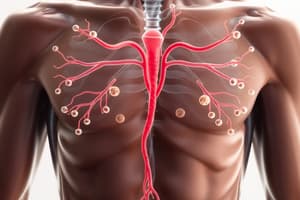Podcast
Questions and Answers
The endocrine system helps in maintaining ______ in animals.
The endocrine system helps in maintaining ______ in animals.
homeostasis
Hormones act as chemical ______, regulating physiological processes.
Hormones act as chemical ______, regulating physiological processes.
messengers
Feedback mechanisms are essential for maintaining balance within the endocrine system, allowing animals to adapt to changing ______.
Feedback mechanisms are essential for maintaining balance within the endocrine system, allowing animals to adapt to changing ______.
conditions
Imbalances in the endocrine system can lead to hormone ______.
Imbalances in the endocrine system can lead to hormone ______.
Disruptions in the endocrine system can lead to various hormone ______.
Disruptions in the endocrine system can lead to various hormone ______.
The hypothalamus, pituitary, thyroid, pancreas, gonads, and adrenal glands are key components of the ______ system.
The hypothalamus, pituitary, thyroid, pancreas, gonads, and adrenal glands are key components of the ______ system.
Examples include hyperadrenocorticism (Cushing's disease) in ______, caused by excessive production of cortisol
Examples include hyperadrenocorticism (Cushing's disease) in ______, caused by excessive production of cortisol
Hyperthyroidism in ______, characterized by excessive thyroid hormone secretion
Hyperthyroidism in ______, characterized by excessive thyroid hormone secretion
Primary hyperfunction or hypofunction of an ______ gland are among the major categories of hormone disorders
Primary hyperfunction or hypofunction of an ______ gland are among the major categories of hormone disorders
Negative feedback occurs when an action inhibits its own further ______, helping to maintain balance
Negative feedback occurs when an action inhibits its own further ______, helping to maintain balance
Insulin is released in response to high blood glucose levels to promote glucose ______
Insulin is released in response to high blood glucose levels to promote glucose ______
Both negative and positive feedback mechanisms contribute to the complex regulation of hormone secretion in ______
Both negative and positive feedback mechanisms contribute to the complex regulation of hormone secretion in ______
Flashcards are hidden until you start studying
Study Notes
Animal Hormone Responses
The endocrine system plays a crucial role in maintaining homeostasis in animals. It consists of various glands that synthesize, store, and release hormones directly into the bloodstream. These hormones act as chemical messengers, regulating numerous physiological processes throughout the body. Imbalances in the endocrine system can lead to hormone disorders, affecting animal health. Feedback mechanisms are essential for maintaining balance within the endocrine system, allowing animals to adapt to changing conditions.
Endocrine System
The endocrine system comprises a series of glands and hormones that regulate various bodily functions. Key components include the hypothalamus, pituitary, thyroid, pancreas, gonads, and adrenal glands. Each gland produces specific hormones that play vital roles in regulating metabolism, growth, reproduction, and stress responses. For instance, the thyroid gland produces thyroxine (T4) and triiodothyronine (T3), which influence metabolic rates and long bone growth. Similarly, the pancreas synthesizes insulin and glucagon, controlling blood sugar levels through their opposing effects.
Hormone Disorders
Disruptions in the endocrine system can lead to various hormone disorders. These may involve hormone overproduction or underproduction, malfunctioning receptors, or disrupted hormone removal pathways. Examples include hyperadrenocorticism (Cushing's disease) in dogs, caused by excessive production of cortisol, and hyperthyroidism in cats, characterized by excessive thyroid hormone secretion. Primary hyperfunction or hypofunction of an endocrine gland, secondary hyperfunction or hypofunction, and endocrine dysfunction due to failure of target cell response are among the major categories of hormone disorders.
Feedback Mechanisms
Feedback mechanisms play a critical role in regulating hormone secretion and maintaining homeostasis. Negative feedback occurs when an action exerted by a hormone inhibits its own further production, helping to maintain balance. For example, insulin is released in response to high blood glucose levels. Its action of promoting glucose uptake leads to a decline in glucose levels, which in turn reduces insulin secretion. Positive feedback, on the other hand, amplifies hormone production and can trigger rapid physiological responses. Both negative and positive feedback mechanisms contribute to the complex regulation of hormone secretion in animals.
In summary, the endocrine system in animals is responsible for producing hormones that regulate various physiological processes. Hormone disorders can occur due to imbalances in hormone production, receptor function, or hormone removal pathways. Feedback mechanisms play a crucial role in maintaining balance within the endocrine system by regulating hormone secretion in response to changes in physiological conditions. Understanding these processes is essential for diagnosing and treating hormonal disorders in animals.
Studying That Suits You
Use AI to generate personalized quizzes and flashcards to suit your learning preferences.




